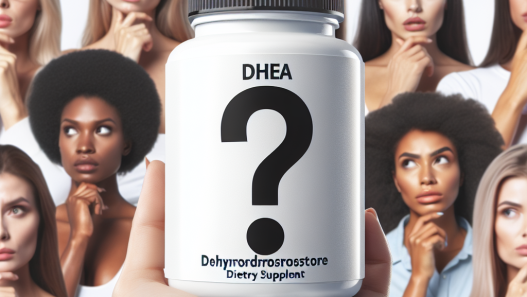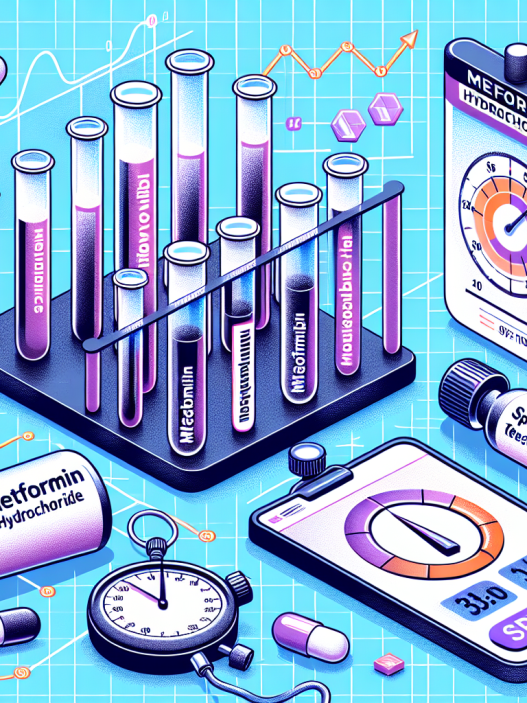-
Table of Contents
«Boost your health with the perfect combination of Metformin Hydrochloride and complementary supplements.»
Introduction
Metformin Hydrochloride is a commonly prescribed medication for the treatment of type 2 diabetes. It works by helping to control blood sugar levels in the body. However, some people may also choose to take supplements in addition to Metformin to further support their health. In this article, we will discuss which supplements may combine well with Metformin Hydrochloride.
The Benefits of Combining Metformin Hydrochloride with Vitamin B12
Metformin Hydrochloride, also known as Metformin HCl, is a commonly prescribed medication for the treatment of type 2 diabetes. It works by reducing the amount of glucose produced by the liver and increasing the body’s sensitivity to insulin. However, like any medication, Metformin HCl may have some side effects, such as vitamin B12 deficiency. This is where the combination of Metformin HCl and Vitamin B12 comes into play.
Vitamin B12, also known as cobalamin, is an essential nutrient that plays a crucial role in the production of red blood cells and the maintenance of a healthy nervous system. It is found naturally in animal products such as meat, fish, and dairy, making it difficult for vegetarians and vegans to obtain enough of this vitamin. Additionally, as we age, our bodies become less efficient at absorbing vitamin B12 from food sources, making supplementation necessary for many individuals.
One of the most significant benefits of combining Metformin HCl with Vitamin B12 is the prevention of vitamin B12 deficiency. Studies have shown that long-term use of Metformin HCl can lead to a decrease in vitamin B12 levels in the body. This is because Metformin HCl interferes with the absorption of vitamin B12 in the small intestine. By supplementing with vitamin B12, individuals taking Metformin HCl can prevent or reverse this deficiency.
Moreover, vitamin B12 supplementation has been shown to improve the effectiveness of Metformin HCl in managing blood sugar levels. A study published in the Journal of Diabetes and Metabolic Disorders found that individuals with type 2 diabetes who took both Metformin HCl and vitamin B12 had better glycemic control compared to those who only took Metformin HCl. This is because vitamin B12 helps with the production of red blood cells, which are responsible for carrying oxygen and nutrients to the body’s cells. With an adequate supply of vitamin B12, the body’s cells can function optimally, leading to better glucose metabolism.
Another benefit of combining Metformin HCl with vitamin B12 is the potential reduction of side effects associated with Metformin HCl use. Some common side effects of Metformin HCl include nausea, diarrhea, and stomach upset. Vitamin B12 has been shown to help alleviate these side effects, making it easier for individuals to tolerate Metformin HCl. Additionally, vitamin B12 has been linked to improved energy levels, which can counteract the fatigue that some individuals experience while taking Metformin HCl.
Furthermore, vitamin B12 supplementation may also have a positive impact on cardiovascular health, which is crucial for individuals with type 2 diabetes. A study published in the Journal of the American College of Nutrition found that vitamin B12 supplementation can improve endothelial function, which is the ability of blood vessels to dilate and constrict. This is important because individuals with type 2 diabetes are at a higher risk of developing cardiovascular disease. By combining Metformin HCl with vitamin B12, individuals can potentially reduce their risk of heart disease.
In conclusion, the combination of Metformin HCl and vitamin B12 has numerous benefits for individuals with type 2 diabetes. It can prevent or reverse vitamin B12 deficiency, improve glycemic control, reduce side effects of Metformin HCl, and potentially improve cardiovascular health. However, it is essential to consult with a healthcare professional before starting any new supplement regimen, as they can provide personalized recommendations based on an individual’s specific needs and medical history. With the right combination of Metformin HCl and vitamin B12, individuals with type 2 diabetes can better manage their condition and improve their overall health and well-being.
Exploring the Synergistic Effects of Metformin Hydrochloride and Omega-3 Fatty Acids
Metformin Hydrochloride is a commonly prescribed medication for individuals with type 2 diabetes. It works by reducing the amount of glucose produced by the liver and increasing the body’s sensitivity to insulin. However, recent studies have shown that combining Metformin with certain supplements can have synergistic effects, providing even greater benefits for those with diabetes.
One supplement that has been found to work well with Metformin is Omega-3 fatty acids. These essential fatty acids are known for their anti-inflammatory properties and have been shown to improve insulin sensitivity and reduce the risk of cardiovascular disease in individuals with diabetes.
When taken together, Metformin and Omega-3 fatty acids have been found to have a synergistic effect on blood sugar control. A study published in the Journal of Clinical Endocrinology and Metabolism found that individuals with type 2 diabetes who took both Metformin and Omega-3 fatty acids had significantly lower fasting blood sugar levels compared to those who only took Metformin.
Furthermore, the combination of Metformin and Omega-3 fatty acids has been shown to improve lipid profiles in individuals with diabetes. A study published in the Journal of Diabetes and its Complications found that the combination of these two supplements led to a significant decrease in triglyceride levels and an increase in HDL (good) cholesterol levels.
But how exactly do these two supplements work together to provide these benefits? It is believed that Omega-3 fatty acids enhance the effects of Metformin by reducing inflammation in the body. Inflammation is a key factor in the development of insulin resistance, and by reducing it, Omega-3 fatty acids can improve the body’s response to insulin.
In addition to their synergistic effects on blood sugar control and lipid profiles, Metformin and Omega-3 fatty acids also have individual benefits for individuals with diabetes. Metformin has been shown to reduce the risk of cardiovascular disease and improve weight loss in individuals with diabetes. On the other hand, Omega-3 fatty acids have been found to improve nerve function and reduce the risk of diabetic neuropathy, a common complication of diabetes.
It is important to note that not all Omega-3 fatty acids are created equal. The two main types of Omega-3 fatty acids are EPA and DHA, and it is recommended to choose a supplement that contains both of these types in order to reap the full benefits. Additionally, it is important to consult with a healthcare professional before starting any new supplement, as they can provide personalized recommendations and monitor for any potential interactions with other medications.
Aside from Omega-3 fatty acids, there are other supplements that have been found to work well with Metformin. These include Vitamin D, which has been shown to improve insulin sensitivity and reduce the risk of diabetes-related complications, and Coenzyme Q10, which has been found to improve blood sugar control and reduce oxidative stress in individuals with diabetes.
In conclusion, the combination of Metformin and Omega-3 fatty acids has been found to have synergistic effects on blood sugar control, lipid profiles, and other aspects of diabetes management. These two supplements work together to reduce inflammation, improve insulin sensitivity, and provide individual benefits for individuals with diabetes. However, it is important to consult with a healthcare professional before starting any new supplement regimen, as they can provide personalized recommendations and monitor for any potential interactions. With the right combination of supplements and medication, individuals with diabetes can better manage their condition and improve their overall health.
Maximizing the Effects of Metformin Hydrochloride with Coenzyme Q10 Supplementation
Metformin Hydrochloride is a commonly prescribed medication for individuals with type 2 diabetes. It works by reducing the amount of glucose produced by the liver and increasing the body’s sensitivity to insulin. However, like any medication, it may come with some side effects. This is where the use of supplements comes into play. One supplement that has shown promising results when combined with Metformin Hydrochloride is Coenzyme Q10 (CoQ10).
CoQ10 is a naturally occurring compound in the body that plays a crucial role in energy production. It is also a powerful antioxidant that helps protect cells from damage caused by free radicals. As we age, our body’s production of CoQ10 decreases, making supplementation necessary. When taken with Metformin Hydrochloride, CoQ10 can help maximize the effects of the medication and potentially reduce some of its side effects.
One of the most common side effects of Metformin Hydrochloride is muscle pain and weakness. This is because the medication can deplete the body’s levels of CoQ10, which is essential for muscle function. By supplementing with CoQ10, individuals may experience a reduction in muscle pain and weakness, allowing them to continue their daily activities without discomfort.
Moreover, CoQ10 has been shown to improve insulin sensitivity, which is a key factor in managing type 2 diabetes. When combined with Metformin Hydrochloride, CoQ10 can enhance the medication’s ability to lower blood sugar levels and improve insulin resistance. This can lead to better glycemic control and potentially reduce the risk of developing complications associated with diabetes.
Another benefit of CoQ10 supplementation is its ability to protect the heart. Metformin Hydrochloride has been linked to an increased risk of heart failure in some individuals. However, CoQ10 has been shown to improve heart function and reduce the risk of heart failure. By taking CoQ10 with Metformin Hydrochloride, individuals may be able to counteract the potential negative effects on the heart and maintain a healthy cardiovascular system.
In addition to its benefits for individuals with type 2 diabetes, CoQ10 has also been shown to improve fertility in women with polycystic ovary syndrome (PCOS). PCOS is a common condition that affects women of reproductive age and is often associated with insulin resistance. By taking CoQ10 with Metformin Hydrochloride, women with PCOS may experience improved ovulation and increased chances of pregnancy.
Furthermore, CoQ10 has been shown to have a positive effect on cognitive function. Metformin Hydrochloride has been linked to cognitive impairment in some individuals, especially in older adults. However, CoQ10 has been shown to improve memory and cognitive function, making it a valuable supplement for those taking Metformin Hydrochloride.
It is important to note that while CoQ10 has shown promising results when combined with Metformin Hydrochloride, it is always best to consult with a healthcare professional before starting any new supplement. They can assess your individual needs and determine the appropriate dosage for you.
In conclusion, CoQ10 is a powerful supplement that can enhance the effects of Metformin Hydrochloride and potentially reduce some of its side effects. From improving muscle function and insulin sensitivity to protecting the heart and improving cognitive function, CoQ10 has numerous benefits for individuals with type 2 diabetes. If you are taking Metformin Hydrochloride, consider adding CoQ10 to your daily routine to maximize the medication’s effects and improve your overall health.
Q&A
1. ¿Qué suplementos se pueden combinar con Metformin Hydrochlorid para mejorar la salud en general?
Algunos suplementos que se pueden combinar con Metformin Hydrochlorid para mejorar la salud en general incluyen vitaminas B12 y D, ácido fólico, magnesio y omega-3. Estos suplementos pueden ayudar a mejorar la función metabólica, reducir la inflamación y apoyar la salud cardiovascular.
2. ¿Es seguro combinar Metformin Hydrochlorid con suplementos herbales?
Siempre es importante consultar con un médico antes de combinar cualquier medicamento con suplementos herbales. Algunos suplementos herbales pueden interactuar con Metformin Hydrochlorid y causar efectos secundarios no deseados. Es importante asegurarse de que los suplementos herbales sean seguros y adecuados para su uso junto con Metformin Hydrochlorid.
3. ¿Qué suplementos deben evitarse al tomar Metformin Hydrochlorid?
Se recomienda evitar el uso de suplementos de cromo y coenzima Q10 mientras se toma Metformin Hydrochlorid, ya que pueden disminuir la eficacia del medicamento. También es importante evitar el uso de suplementos de hierro y calcio al mismo tiempo que Metformin Hydrochlorid, ya que pueden interferir con la absorción del medicamento. Siempre es mejor consultar con un médico antes de combinar cualquier suplemento con Metformin Hydrochlorid.










